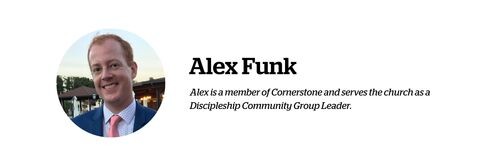People of the Word

by Alex Funk
“Bible literacy matters because it protects us from falling into error. Both the false teacher and the secular humanist rely on biblical ignorance for their messages to take root, and the modern church has proven fertile ground for those messages. Because we do not know our bibles, we crumble at the most basic challenges to our worldview.”
– Jen Wilkin, Women of the Word
I struggled a lot with how to write this post. I was concerned that maybe the above quote overstated the issue. Perhaps it made the situation sound too dire. But, if our God has revealed Himself in His Word, then where else are we to go if we want to know Him as He desires to be known? In all honesty, I believe wholeheartedly in the vast importance of biblical literacy, and this is precisely why I am excited to read Women of the Word with my brothers and sisters at Cornerstone and to discuss it at our upcoming book discussion on Sunday, June 30th.
There is so much I could say about this book and about the profound impact Jen Wilkin’s ministry has had on me. Wilkin very clearly lays out a case for the importance of biblical literacy. Biblical literacy isn’t coming to a point of final achievement in knowing the Bible inside and out, but it is about a steady movement toward greater knowledge and understanding of the text. Wilkin believes this is a goal and a blessing to which we all can attain. Biblical literacy is not just for university professors and pastors. We all have the amazing blessing of having the Word of God in our own language—and often in our own pocket—at all times. We can progress toward beholding God more and more in his Word, and we can do it together!
The whole title of the book needs to be said, although it is a mouthful: Women of the Word: How to Study the Bible with Both Our Hearts and Our Minds. Jen Wilkin does have a particular eye toward elevating women to study the Bible with rigor, utilizing their minds when they can sometimes be only asked about how they feel and not what they think. However, her focus on the importance of studying the Bible with “both our hearts and our minds” is necessary for all in the church to hear. In the very first chapter, I resonated with Wilkin as she spoke about having a fragmented knowledge of the Bible. I knew the Gospel, had memorized a handful of verses, and knew all the stories that could fit on a felt board. What I didn’t know was how they all fit together into one grand story about God. The strategies and outlines she gives for sound Bible study are universal and utterly helpful. I really hope that my brothers at Cornerstone can get past the use of “she” and “her” pronouns (and the anecdote about ruffled tights) to hear the profound truth, encouragement, and exhortation that Wilkin has to share throughout the book.
In the introduction to the book, Wilkin compares her early Biblical understanding and the bad habits of Bible study that came with it to a mountain of dirt that hindered her complete view of God. She includes a saying: “How do you move a mountain? One spoonful of dirt at a time.” Her desire is to put spoons into the hands of as many of her readers as she can. I am so blessed by the spoon I got from her, and I really want to see more members of our church take up their own spoons. We all have mountains of Biblical ignorance that stand between us and a proper vision of God “high and lifted up.” I will sign off with her quote at the end of her introduction: “This is a book for those who are ready to face squarely the mountain of their fragmented understanding of scripture and, brandishing a spoon, command it to move.”
There is so much I could say about this book and about the profound impact Jen Wilkin’s ministry has had on me. Wilkin very clearly lays out a case for the importance of biblical literacy. Biblical literacy isn’t coming to a point of final achievement in knowing the Bible inside and out, but it is about a steady movement toward greater knowledge and understanding of the text. Wilkin believes this is a goal and a blessing to which we all can attain. Biblical literacy is not just for university professors and pastors. We all have the amazing blessing of having the Word of God in our own language—and often in our own pocket—at all times. We can progress toward beholding God more and more in his Word, and we can do it together!
The whole title of the book needs to be said, although it is a mouthful: Women of the Word: How to Study the Bible with Both Our Hearts and Our Minds. Jen Wilkin does have a particular eye toward elevating women to study the Bible with rigor, utilizing their minds when they can sometimes be only asked about how they feel and not what they think. However, her focus on the importance of studying the Bible with “both our hearts and our minds” is necessary for all in the church to hear. In the very first chapter, I resonated with Wilkin as she spoke about having a fragmented knowledge of the Bible. I knew the Gospel, had memorized a handful of verses, and knew all the stories that could fit on a felt board. What I didn’t know was how they all fit together into one grand story about God. The strategies and outlines she gives for sound Bible study are universal and utterly helpful. I really hope that my brothers at Cornerstone can get past the use of “she” and “her” pronouns (and the anecdote about ruffled tights) to hear the profound truth, encouragement, and exhortation that Wilkin has to share throughout the book.
In the introduction to the book, Wilkin compares her early Biblical understanding and the bad habits of Bible study that came with it to a mountain of dirt that hindered her complete view of God. She includes a saying: “How do you move a mountain? One spoonful of dirt at a time.” Her desire is to put spoons into the hands of as many of her readers as she can. I am so blessed by the spoon I got from her, and I really want to see more members of our church take up their own spoons. We all have mountains of Biblical ignorance that stand between us and a proper vision of God “high and lifted up.” I will sign off with her quote at the end of her introduction: “This is a book for those who are ready to face squarely the mountain of their fragmented understanding of scripture and, brandishing a spoon, command it to move.”

Posted in Bible and Theology
